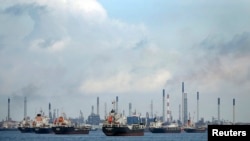A Malaysian-flagged oil tanker has been hijacked in the South China Sea and its cargo siphoned. It is the latest in a recent spate of such incidents blamed on sophisticated criminal gangs.
The Royal Malaysian Navy says 15 crewmembers aboard the drifting MT Oriental Glory are safe but three crew members are reported to have been injured after the tanker was hijacked and 2,500 tons of marine gas oil were stolen from the vessel.
Hijacked tanker
The 85-meter-long ship was en route to Sandakan in Malaysian Borneo from Singapore when it was attacked just before midnight.
The pirates damaged the ship’s communications equipment and engine.
This is the ninth such hijacking since late April.
During these incidents the attackers, after commandeering the vessels, have siphoned the diesel or gasoline onto pirate bunker barges or other tankers.
Some specialists believe that better reporting by crews and ship owners may partly explain the upsurge in such incidents recently.
The identity of the gangs remain unknown. Also unclear is whether the profits from black market sales of the siphoned fuel might be financing political or more nefarious activities, such as terrorism.
But what is certain, according to Ian Millen, the chief operating officer of Dryad Maritime, is the hijackings are the work of highly organized criminal professionals with knowledge of how to disable critical ship systems.
“We're talking here about things like communications and navigation systems that will make life difficult for owners or any kind of law enforcement to track and detect these vessels once they've been hijacked. They also show experience and expertise in being able to handle things like fuel transfer hoses,” said Millen.
The International Maritime Bureau issued a warning last month to small tankers to “maintain strict anti-piracy measures in the South China Sea.”
Operating with impunity
The IMB is to release this week its detailed bi-annual report on pirate attacks globally, which will note the escalation of hijackings of small tankers in the South China Sea.
International Maritime Bureau director Pottengal Mukundan blames the attacks on a few gangs that operate with impunity when extracting a valuable commodity from soft targets.
“The cost of diesel oil is expensive. So they see a financial return in this. There hasn't been any of these gangs, so far, caught and punished by the countries in the region. So, I think, they see it as an easy option, so far. But having said that the navies, the coast guards and the police are very aware of it in these countries. And, I think, that they will be looking to catch one of these gangs soon and punish them under law,” Mukundan explained.
The U.K-based Dryad maritime intelligence consultancy advises that the best defense against such attacks is for crews to remain alert around the clock by keeping visual and radar watches and keeping the movements of their vessels confidential.
If that fails, experts say crews can try to spray water or foam towards the pirates or use ballast pumps to flood the decks to deter boarding attempts.
Vulnerabilities
Though the pirates in the South China Sea are armed with machetes, knives and sometimes guns and do threaten to use their weapons, Dryad’s Millen said, there are hurdles to employing armed guards on the vulnerable ships.
“We're talking about a lot of territorial waters, which is the sort of the place these acts take place or very close to them. The logistics and the legal implications of operating armed guards in this very complex archipelagic region make life difficult for that kind of thing,” said Millen.
Maritime piracy was a significant problem in the Strait of Malacca until 2006.
Since then, until this April, in the Strait or the adjacent South China Sea, there would usually be no more than one or two tanker hijackings per year.
The pirates now appear to be specifically targeting smaller sized vessels carrying fuel, avoiding supertankers. They have abandoned attacks on tankers carrying chemicals, such as methanol or bitumen, which are not so easy to sell.




